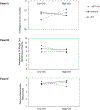The Relation of Grit to Weight Loss Maintenance Outcomes
- PMID: 35496324
- PMCID: PMC9053131
- DOI: 10.1016/j.jcbs.2022.03.008
The Relation of Grit to Weight Loss Maintenance Outcomes
Abstract
Biological, genetic, and environmental factors make weight loss very difficult. Acceptance-based behavioral treatment (ABT) supplements standard behavioral treatments (BT) for obesity by teaching skills to accept the discomfort inherent to weight control behaviors and prioritize long-term, values-based goals. Grit, the ability to persevere in goal pursuit, overlaps conceptually with ABT principles and may predict outcomes in ABT. During a randomized controlled trial comparing three weight loss interventions (BT, BT with an emphasis on physical activity [BT+PA], ABT with an emphasis on physical activity [ABT+PA]), this study examined if grit predicted weight loss, intervention engagement (session attendance and dietary self-monitoring), and perceived intervention effectiveness, and whether intervention condition moderated these relationships. Participants (N=309) with overweight/obesity enrolled in an 18-month weight loss intervention completed the Short Grit Scale at baseline. Weight and PA were measured at baseline, during the intervention (12 and 18 months), and at follow-up (24 and 36 months). Session attendance and dietary self-monitoring were assessed throughout the intervention, and perceived intervention effectiveness at end-of-intervention. The relation of grit to several outcomes depended on condition. In ABT+PA, but not BT or BT+PA, lower grit related to higher weight loss at 12 and 24 months, session attendance, and perceived intervention effectiveness. Grit was not related to PA or dietary self-monitoring in any condition. ABT's focus on building skills to facilitate long-term goal pursuit may be unique and beneficial to those with lower grit. Those with higher grit may already possess ABT-consistent skills and benefit less from ABT. Research on trait-level characteristics like grit in relation to weight must be cautious not to reinforce weight bias; rather, this work suggests that an evidence-based intervention (ABT) may be well-suited to those with lower grit levels seeking weight loss.
Keywords: acceptance and commitment therapy; behavioral weight loss; grit; obesity; weight loss maintenance.
Conflict of interest statement
Declaration of interests The authors declare that they have no known competing financial interests or personal relationships that could have appeared to influence the work reported in this paper.
Figures

References
-
- Berman MI, Morton SN, & Hegel MT (2016). Health at every size and acceptance and commitment therapy for obese, depressed women: Treatment development and clinical application. Clinical Social Work Journal, 44(3), 265–278. 10.1007/s10615-015-0565-y - DOI
-
- Brewis AA (2011). Obesity: Cultural and Biocultural Perspectives. Rutgers University Press.
-
- Butryn ML, Call CC, & Remmert JE (2019). Acceptance-based behavioral counseling. Current Opinion in Endocrine and Metabolic Research, 4, 70–74. 10.1016/j.coemr.2018.09.004 - DOI
Grants and funding
LinkOut - more resources
Full Text Sources
Miscellaneous
